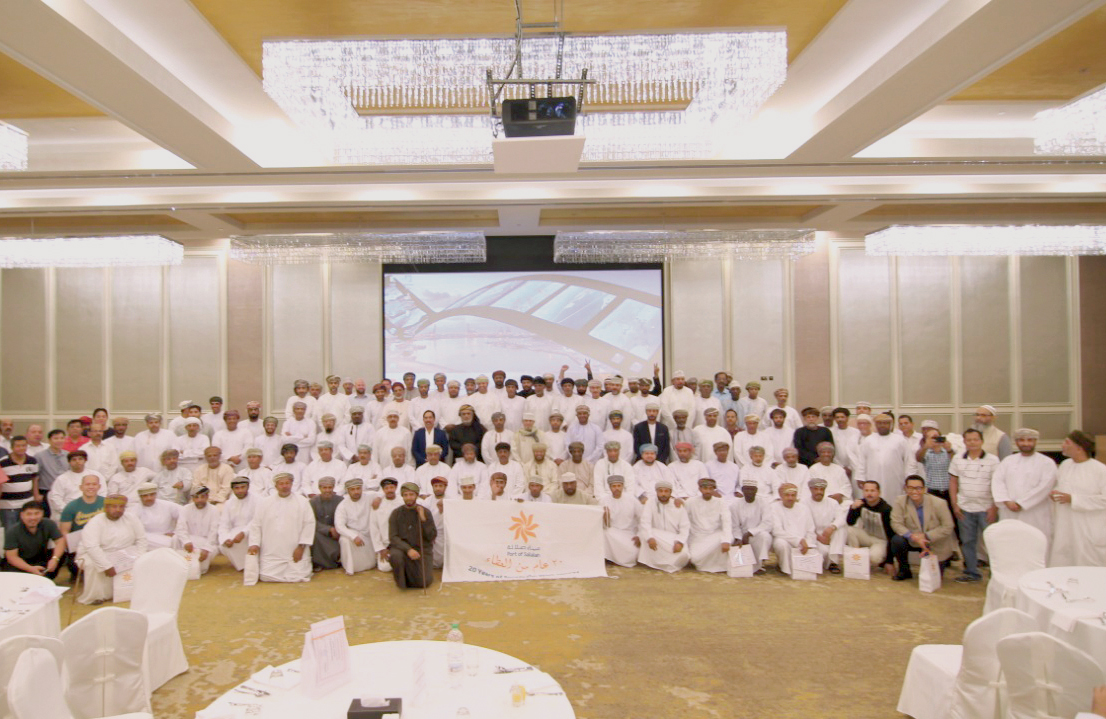

SALALAH, Dec 30 - Port of Salalah (PoS) celebrated its 20th anniversary at a gala event at Millennium Salalah Resort by honouring some 200 employees who are associated with the port since its inception in 1998.
Addressing a gathering of the employees who completed 20 years in the Port of Salalah, Ahmed Ali Akak, Deputy CEO, called the event an important occasion in the history of ports in Oman due to its importance in region’s trade, as the PoS played a significant role due to its strategic location for many centuries.
“I thank our employees who toiled hard to convert this port into an international one by dint of their hard work. Operation from small jetty to state of the art facility today is a long journey for the Port of Salalah.
The port has achieved many milestones during all these years and I would say we capitalise on our people. More than 220 people, who started with the company, are still with us. It shows their level of commitment and our best possible treatment with our human resource,” said Akak.
Yogesh Kumar, Senior Manager Finance is among many employees, who are with the port for the last 20 years. He called his association with the port as “a great fascinating journey so far and port has given me lots of opportunities to learn and develop professionally and personally. Learning and working with different nationalities changed my perception as a leader.
Sultanate of Oman is probably my second home and Salalah port is part of my family. I have seen my kids growing up here and getting the right education. My wife and I enjoy every moment we spend here in Salalah.”
“I certainly would not want to end here and would like to see Salalah Port achieve even greater heights in terms of utilising full capacity of five million TEUS and think as much the company and country has given me, I would like to reciprocate in my own way from time to time and by sharing knowledge and experience with young locals,” he said.
Nadya Mohammed Said al Shibani, MIS manager is an Omani working with the Port of Salalah for the last 20 years. She started as a secretary in some department the beginning but by dint of her hard work and support from the establishment she achieved her goal of working in the MIS system and today she is Manager MIS at the port.
“I thank the PoS for its support in terms of training and even education. I got very good opportunities and I term my association as wonderful. I learnt through challenges and I am happy with every challenge, the PoS was there with me,” she said.
Mohammed al Mashani, Port of Salalah General-Manager Corporate Affairs, called it an important moment for the port.
“I take proud in saying that from a small jetty in 1998 the port today is ranking as number one port in exporting gypsum and number 11 in transshipment among ports globally.”
“Dhofar has been historically recognised as an ideal trading hub in the region with archeologists finding evidence of trading activities as early as first century CE when it was an important location for the regional trade especially the trade in frankincense.”
The port is strategically located and is the closest port in Oman to the main East West trade shipping corridor and is one the region’s best located port in order to access the growing markets of Middle East, Indian subcontinent and East Africa. Salalah Port Services Company (SAOG), the concession holder for the Port of Salalah is managed by managed by APM Terminals which is operates over 65 terminals around the world and presently handles over 3000 vessels each year.
The container terminal, according to Al Mashani, is presently 39th in the global raking in terms of volumes. “The General Cargo terminal is one of the biggest common user terminal in the region and has handled over 85 Million MT of cargo till date with a continuing growth trajectory handling a diverse range of commodities like aggregates, cement, wheat, chemicals, food products, vehicles, project cargo etc.”
Oman Observer is now on the WhatsApp channel. Click here



